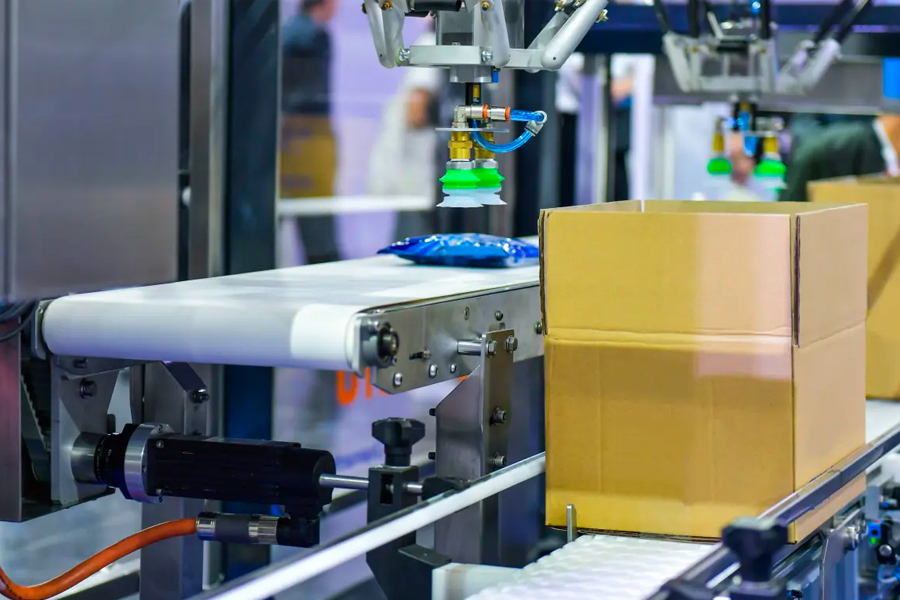Logistics
Warehousing & Fulfillment
Transportation
Industries
Technology & Innovations
E-commerce
E-commerce Fulfillment Services
Lease & Maintenance
Semi Trucks
Logistics
E-commerce
Lease & Maintenance
Buy Used Trucks

As online buying soared during the pandemic, many e-commerce companies lost control of their supply chains. Businesses that relied on particular marketplaces to deliver for them through their e-commerce channels encountered carrier constraints. In some cases, shipments were delayed or the amount of goods they could send were limited, leaving customers frustrated.
Companies need resiliency and flexibility built into their e-commerce business so that they can adapt to changing and challenging demands in the post-pandemic world.
To achieve that resiliency and flexibility, many companies are turning to third-party logistics providers (3PL), an outsourced business that handles a company’s supply chain and logistics operations. At the same time, e-commerce companies sometimes are concerned about cost and control issues when they outsource their logistics. That’s why it’s critical to choose a 3PL with the right capabilities and a partnership mindset.
“End-customers have very high expectations and are often unforgiving,” says Dr. Simone Peinkofer, an assistant professor of supply chain management at Michigan State University. “Any glitches in order fulfillment such as late deliveries, which end-customers would attribute to the retailer, could lead to substantial negative repercussions. You want a 3PL that can fulfill end-customer demands over time set to the retailer’s standard.”
Resources at the Ready
Given high customer expectations, an e-commerce company needs a 3PL with the right resources to create a compelling experience, such as a 3PL with an extensive network with numerous locations. Partners can get their inventory closer to customers, reducing the significant cost of last-mile delivery. Multiple locations also provide redundancy in case weather or other problems close down one facility.
Since e-commerce companies don’t provide an in-store experience, a primary way to reinforce their brand is through customized packaging and packing slips or inserts that go into packages. Working with a 3PL that can support those requirements can be essential. Embroidery, foil stamping, gift wrapping and other added-value services are key differentiators for some e-commerce companies. Not every 3PL can support those services.
Historically, e-commerce fulfillment is also labor-intensive. A 3PL needs both access to labor and the ability to reduce the dependency on labor while maintaining quality by using technology and automation to improve efficiencies. Autonomous Mobile Robots (AMR), which handle material in warehouses, can reduce the number of people you need in picking operations by half, and increase safety.
Accessing Information
When it comes to maintaining control, a key element of the 3PL relationship is information. One of the biggest concerns that e-commerce companies have, if they partner with a 3PL, is a feeling of a loss of control, because they’re reliant upon someone else to do things they’ve done historically in-house. Having access to your order data and inventory data in real time reinforces that you still have that control.
Consider the critical area of returns. Many e-commerce companies want to credit the customer as soon as possible so that the customer has a positive experience and wants to come back. Having visibility into the moment the reverse package enters the supply chain can reinforce the company’s brand.
E-commerce companies should also be able to make key decisions on logistics when working with a 3PL. An order for multiple items with inventory spread across different areas requires delicate calculations. Do you want to put everything together and send it in a single shipment, even if it’s from further away? Is speed to the consumer the most important consideration? The 3PL should have technology that allows the e-commerce seller to stay in control and make the decision on how the orders are processed.
Partnering in the Present and Future
An e-commerce company should expect a 3PL to treat it as a partner. When an issue arises, you don’t want to wait for a response to a help ticket or email to an nameless address. A dedicated manager who understands your business and challenges can not only respond faster, they can also facilitate weekly tactical touchpoints and quarterly strategic reviews. That’s when you know you have a true partnership.
It can be hard to predict what services an e-commerce company might need six months or a year down the line. It’s essential to find a partner who has capabilities that allow for growth. A 3PL that acts as a partner is constantly presenting new ideas, such as inviting customers to take part in a pilot on microfulfillment.
“Even before the pandemic started, retailers were continuously working on improving their fulfillment strategy and developing new fulfillment services,” Peinkofer says. “However, it was just not as pressing as it became once the pandemic hit. Suddenly reevaluating their fulfillment strategy and reconfiguring their resources to continue servicing their end-customers became key to making it through the pandemic.”
That perpetual improvement will be a customer expectation going forward, so e-commerce companies need partners that can help them provide it.